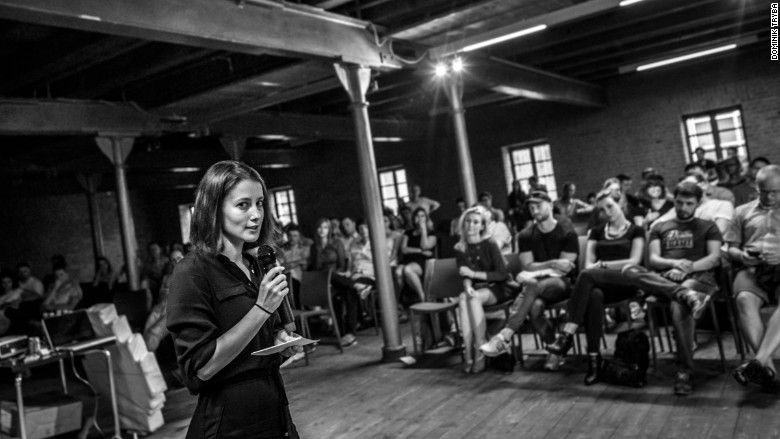
Like computers, we too are programmed. We're wired with the beliefs instilled in us by parents, religion, culture and friends. It's our "code."
But can we upgrade ourselves? Patrycja Slawuta says yes.
Slawuta, who was born and raised in Poland, has spent more than a decade studying the mind. She's so sure of our ability to "recode" that she's created a business out of it.
Self Hackathon hosts monthly events to help attendees understand -- and rewire -- their impulses.
As someone who has dabbled in everything from yoga to meditation to text therapy, I wondered how Slawuta's events might compare. So on a February evening in New York City, I gathered with 40 strangers -- from software engineers to doctors -- to attend "Hacking Heart."
Related: The confidence gap: Can daily text messages help?
The event was led by Slawuta, along with Kundalini yoga instructor Anne Koller and ad exec-turned-spiritual guru Asil Toksal. Each event is themed; past ones have included attraction and intimacy, new beginnings, and shame.
For the next two hours, what followed was part TEDx talk, part mindfulness workshop.
"People are (blank). Finish [the sentence] three times," said Slawuta, 33, who also works directly with CEOs, startups and big companies. "It's one of the ways you can start seeing your own code ... Do you believe that the universe is malevolent or benevolent?"
The answer to that question reveals a lot about how we view the world. It can also be a big contributor to loneliness, Slawuta said. Those who feel lonely often view daily interactions as threats or malicious. But questioning your reaction -- "Did they really mean to insult me?" -- can change how you respond.
"Loneliness is a perceived social isolation," she said, adding that the number of people who identify as lonely in the U.S. has grown in recent decades, despite how digitally connected people are.
Related: Does text therapy actually work?
Slawuta has trained under people like Philip Zimbardo, who conducted the famous Stanford prison experiment in the 1970s.
"I like to explore the dark side of human nature and how powerful it is," said Slawuta, who has a master's degree in psychology and is a PhD candidate. Her research focuses on shame and guilt, especially in extreme intergroup situations like genocide and terrorism.
Slawuta was diagnosed with complex PTSD as an adult, something she's actively worked to address.
"The big thing was how did I see the world?" she said. "I had to understand, what is the code that runs my psychological operating system?" She said that, combined with meditation, has helped. While most scientific research never makes it into the hands of those it can help, Slawuta wants to change that.
Next up was Koller, who had us stand up, scrunch up our faces with frustration and let it go, which was meant to understand how different emotions manifest themselves physically. She spoke about how forgiveness can have a positive physical impact on on the body.
"Not to forgive is like drinking poison and waiting for your enemies to die," she said, tasking us to forgive ourselves for three things in the future.
Toksal challenged us to look at ourselves deeply in the mirror and profess self-love. (To make it more challenging, he said, do it fully naked.)
Related: CNNMoney's Upstart 30
Slawuta's events are capped at 50 people and cost between $50 and $100. So far, more than 1,500 people have attended. Those who come, Slawuta says, tend to be "super high-performing individuals who need a bit of tweaking."
To respond to demand, Slawuta is currently building out a tech component that will use machine learning to assess and customize "mind hacks" for individuals.
Slawuta isn't the only entrepreneur interested in mindfulness. Headspace, a meditation app, raised $30 million in September, and competitor Calm has also banked $1 million in funding.
"We're trying to make science sexy again," said Slawuta. "We make it relevant. We provide the science, the art is yours."

